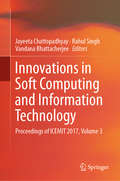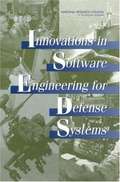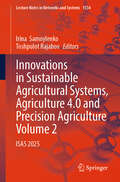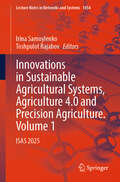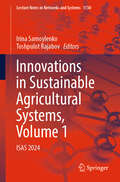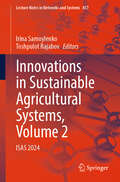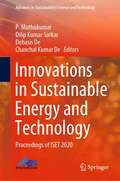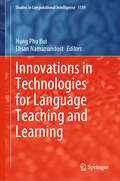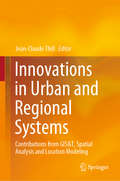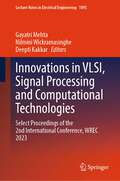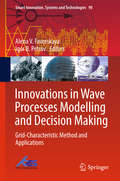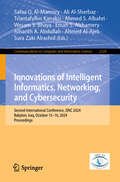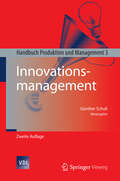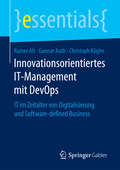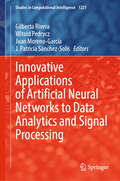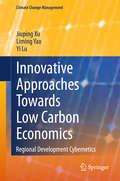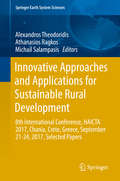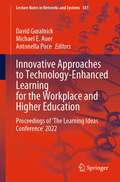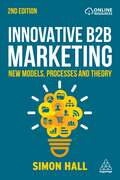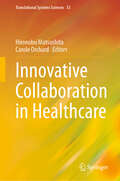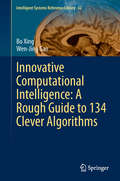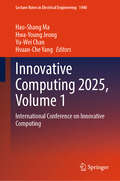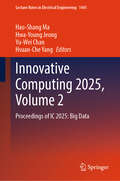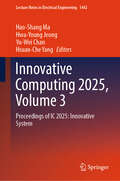- Table View
- List View
Innovations in Soft Computing and Information Technology: Proceedings of ICEMIT 2017, Volume 3
by Rahul Singh Jayeeta Chattopadhyay Vandana BhattacherjeeThe book presents innovative scientific research works by academics, research scholars and students, presented at the 2017 International Conference on Energy, Materials and Information Technology at Amity University Jharkhand, India. It includes contributions on system solutions based on soft computing techniques, and covers innovative soft computing techniques and tools with advanced applications. A major focus of the book is on presenting interdisciplinary problems and how they can be solved using information technology, together with innovative connections to other disciplines. It also includes papers on cloud computing and WSN-related real-time research.
Innovations in Software Engineering for Defense Systems
by Oversight Committee for the Workshop on Statistical Methods in Software Engineering for Defense SystemsInformation on the Innovations in Software Engineering for Defense Systems
Innovations in Sustainable Agricultural Systems, Agriculture 4.0 and Precision Agriculture, Volume 2: ISAS 2025 (Lecture Notes in Networks and Systems #1534)
by Irina Samoylenko Toshpulot RajabovThis book delves into the transformative technologies and practices that are shaping the future of agriculture, emphasizing the importance of sustainability. Key themes explored in the book include: I. Digital Agricultural Techniques, Tools and Systems, which highlight the role of data analytics and automation in optimizing farm operations; II. Sustainable Development of Agricultural and Food Production, focusing on regenerative practices that promote soil health and enhance food security; III. Economic, Ecological and Social Systems for Human Development, examining how integrated approaches can enhance rural livelihoods and community resilience; IV. Sustainability in Animal Husbandry and Veterinary Practice, addressing innovations that improve animal welfare while minimizing environmental impacts. This book serves as an invaluable resource for researchers, farmers, policymakers and students, providing a multidisciplinary perspective on how innovative agricultural practices can lead to a sustainable and resilient food system.
Innovations in Sustainable Agricultural Systems, Agriculture 4.0 and Precision Agriculture. Volume 1: ISAS 2025 (Lecture Notes in Networks and Systems #1454)
by Irina Samoylenko Toshpulot RajabovThis book delves into the transformative technologies and practices that are shaping the future of agriculture, emphasizing the importance of sustainability. Key themes explored in the book include: I. Digital Agricultural Techniques, Tools and Systems, which highlight the role of data analytics and automation in optimizing farm operations; II. Sustainable Development of Agricultural and Food Production, focusing on regenerative practices that promote soil health and enhance food security; III. Economic, Ecological and Social Systems for Human Development, examining how integrated approaches can enhance rural livelihoods and community resilience; IV. Sustainability in Animal Husbandry and Veterinary Practice, addressing innovations that improve animal welfare while minimizing environmental impacts. This book serves as an invaluable resource for researchers, farmers, policymakers and students, providing a multidisciplinary perspective on how innovative agricultural practices can lead to a sustainable and resilient food system.
Innovations in Sustainable Agricultural Systems, Volume 1: ISAS 2024 (Lecture Notes in Networks and Systems #1130)
by Irina Samoylenko Toshpulot RajabovThis multidisciplinary book focuses on the best practices in a range of areas, such as: I. Sustainable development of agricultural production; II. Intelligent agricultural techniques, tools, and systems; III. Sustainability in veterinary practice; and IV. Economic, ecological and social systems for human development. This book is a truly interdisciplinary publication, useful to scholars, social movements, practitioners, and members of governmental agencies and private companies. Sustainable agricultural systems are crucial for ensuring food security, conserving natural resources and mitigating climate change. Innovations in this field play a key role in improving agricultural practices to make them more environmentally friendly, economically viable and socially responsible. By implementing the innovative approaches and technologies, sustainable agricultural systems can help address the challenges facing agriculture in the twenty-first century and build a more resilient and sustainable food system for the future.
Innovations in Sustainable Agricultural Systems, Volume 2: ISAS 2024 (Lecture Notes in Networks and Systems #857)
by Irina Samoylenko Toshpulot RajabovSustainable agricultural systems are crucial for ensuring food security, conserving natural resources and mitigating climate change. Innovations in this field play a crucial role in improving agricultural practices to make them more environmentally friendly, economically viable and socially responsible. By implementing the innovative approaches and technologies, sustainable agricultural systems can help address the challenges facing agriculture in the 21st century and build a more resilient and sustainable food system for the future. This multidisciplinary book focuses on the best practices in a range of areas, such as: I. Intelligent agricultural techniques, tools and systems; II. Sustainability in veterinary practice; III. Economic, ecological and social systems for human development; IV. Sustainable development of agricultural production. This book is a truly interdisciplinary publication, useful to scholars, social movements, practitioners and members of governmental agencies and private companies.
Innovations in Sustainable Energy and Technology: Proceedings of ISET 2020 (Advances in Sustainability Science and Technology)
by P. Muthukumar Dilip Kumar Sarkar Debasis De Chanchal Kumar DeThis book presents best selected research papers presented at Innovation in Sustainable Energy and Technology India (ISET 2020), organized by Energy Institute Bangalore (A unit of RGIPT, an Institute of National Importance), India, during 3–4 December 2020. The book covers various topics of sustainable energy and technologies which includes renewable energy (solar photovoltaic, solar thermal and CSP, biomass, wind energy, micro hydro power, hydrogen energy, geothermal energy, energy materials, energy storage, hybrid energy), smart energy systems (electrical vehicle, cybersecurity, charging infrastructures, IOT & AI, waste management, PHEV (CNG/EV) and mobility (smart grids, IOT & AI, energy-efficient buildings, mart agriculture).
Innovations in Technologies for Language Teaching and Learning (Studies in Computational Intelligence #1159)
by Hung Phu Bui Ehsan NamaziandostThis edited book discusses the current issues and reports research conducted around the world. The advent of technology has changed the landscape of language education. The chapter topics are quite diverse, targeting the needs of undergraduate and graduate students and researchers. It views the mosaic of the field from cognitive, affective, educational, and educational perspectives. All the chapters give implications for further advances in technology and education.
Innovations in Urban and Regional Systems: Contributions from GIS&T, Spatial Analysis and Location Modeling
by Jean-Claude ThillThis book presents cutting‐edge research on urban and regional systems applying modern spatial analytical techniques of Geographic Information Science & Technologies (GIS&T), spatial statistics, and location modeling. The contributions, written by leading scholars from around the globe, adopt a spatially explicit analytical perspective and highlight methodological innovations and substantive breakthroughs on many facets of the socioeconomic and environmental reality of urban and regional contexts. The book is divided into three parts: The first part offers an introduction to the research field, while the second part discusses critical issues in urban growth and urban management, presenting case studies on city and urban environments, their growth, data infrastructures and spatial and management issues. The third part then broadens the analysis to the regional scale, addressing growth, convergence and adaptation to new economic and information‐based realities. This book appeals to scholars of spatial and regional sciences as well as to policy decision-makers interested in advanced methods of spatial analysis, location modeling, and GIS&T.
Innovations in VLSI, Signal Processing and Computational Technologies: Select Proceedings of the 2nd International Conference, WREC 2023 (Lecture Notes in Electrical Engineering #1095)
by Nilmini Wickramasinghe Deepti Kakkar Gayatri MehtaThis volume comprises the select proceedings of the 2nd International Conference on Women Researchers in Electronics and Computing (WREC 2023). The content discusses novel contributions and the latest developments in signal/image processing, VLSI design, futuristic communication, and computational technologies. The contents include papers on signal processing for communications & networking, machine learning and deep learning for signal processing, human-computer interface, 5G/6G wireless technologies, green and energy efficient wireless networks, software-defined networking (SDN), optical communications and networks, mobility management and models, VLSI testing, ASIC/FPGA design, analog/digital and mixed signals ICs, biosensors and bioelectronics, knowledge engineering, 3D printing and scanning, computational intelligence, among others. This volume will be of immense interest to researchers in academia and industry working in electronics, communication, and signal processing.
Innovations in Wave Processes Modelling and Decision Making: Grid-Characteristic Method and Applications (Smart Innovation, Systems and Technologies #90)
by Alena V. Favorskaya Igor B. PetrovThis book presents methods for full-wave computer simulation that can be used in various applications and contexts, e.g. seismic prospecting, earthquake stability, global seismic patterns on Earth and Mars, medicine, traumatology, ultrasound investigation of the human body, ultrasound and laser operations, ultrasonic non-destructive railway testing, modelling aircraft composites, modelling composite material delamination, etc. The key innovation of this approach is the ability to study spatial dynamical wave processes, which is made possible by cutting-edge numerical finite-difference grid-characteristic methods. The book will benefit all students, researchers, practitioners and professors interested in numerical mathematics, computer science, computer simulation, high-performance computer systems, unstructured meshes, interpolation, seismic prospecting, geophysics, medicine, non-destructive testing and composite materials.
Innovations of Intelligent Informatics, Networking, and Cybersecurity: Second International Conference, 3INC 2024, Babylon, Iraq, October 15–16, 2024, Proceedings (Communications in Computer and Information Science #2329)
by Safaa O. Al-Mamory Ali Al-Sherbaz Triantafyllos Kanakis Ahmed S. Albahri Wesam S. Bhaya Eman S. Alshamery Alharith A. Abdullah Ahmed Al-Ajeli Sura Zaki AlrashidThis book constitutes the proceedings of the Second International Conference on Innovations of Intelligent Informatics, Networking and Cybersecurity, 3INC 2024, which took place in Babylon, Iraq, during October 15-16 2024. The 15 full papers included in this volume were carefully reviewed and selected from 69 submissions. They were organized in topical sections as follows: Information systems; computing methodologies; and security and privacy.
Innovationsmanagement
by Günther SchuhDer dritte Band des Handbuchs liefert einen aktuellen und umfassenden Überblick zum Gebiet Innovationsmanagement. Adressiert werden die Themen strategisches Innovationsmanagement, Produktplanung, Produktarchitekturgestaltung, Gestaltung von Produktentwicklungsprozessen, Innovationscontrolling und Product Lifecycle Management. Zu jedem der im Handbuch behandelten Gebiete werden grundlegende Zusammenhänge, Prinzipien und Methoden ausführlich dargestellt. Zusätzlich werden die vermittelten Theorien anhand ausgewählter Fallbeispiele veranschaulicht.
Innovationsorientiertes IT-Management mit DevOps: IT im Zeitalter von Digitalisierung und Software-defined Business (essentials)
by Rainer Alt Gunnar Auth Christoph KöglerDieses essential verbindet die neue Welt der Digitalisierung mit dem klassischen IT-Management. Es erkennt die Softwareentwicklung und das Softwaremanagement als wichtiges Element digitaler Innovationen. Dazu f#65533;hren die Autoren ausf#65533;hrlich in das Software-defined Business ein und legen die Grundlagen eines innovationsorientieren IT-Managements. Die auf agilen Verfahren aufbauende DevOps-Methode repr#65533;sentiert einen L#65533;sungsansatz, der schnelle (Re)Aktion durch digitale Innovation einerseits und langfristige Entwicklungszyklen sowie stabilen Betrieb andererseits verbindet. Eine umfassende Fallstudie bei der T-Systems Multimedia Systems illustriert den Einsatz von DevOps in der Praxis.
Innovative Applications of Artificial Neural Networks to Data Analytics and Signal Processing (Studies in Computational Intelligence #1171)
by Witold Pedrycz Gilberto Rivera J. Patricia Sánchez-Solís Juan Moreno-GarciaThis book deals with the application of ANNs in real-world problems requiring data analysis and signal processing. Artificial neural networks (ANNs) have emerged in society thanks to the large number of applications that have been used in an awe-inspiring way. These networks offer effective solutions to practical, real-world problems. The wide variety of application fields of the studies in the book is remarkable; these are related to sensorization, agriculture, healthcare, air pollution, video games, and cybersecurity, among others. To organize this variety, the chapters have been grouped into three sections related to: (1) Forecasting and Prediction, (2) Knowledge Discovery and Knowledge Management, and (3) Signal Processing. This book aims to reach readers interested in ANNs and their applications in different fields, so it is interesting not only for computer science but also for other related disciplines.
Innovative Approaches Towards Low Carbon Economics
by Yi Lu Jiuping Xu Liming YaoClimate change is an inevitable and urgent global challenge with long-term implications for the sustainable development of all countries. To overcome this human crisis, the scientific consensus is driving global action towards low carbon economics. Though this action has to involve all sectors (industries, governments, and citizens) and at all levels (global, national and regional levels), the implementation of climate strategies will predominantly be at the regional level. By establishing an innovative range of model technologies, this book aims to develop systematic quantificational methods, such as uncertain multi-objective programming models and system dynamics models, to provide a new approach to low carbon economics that can serve as a paradigm for general regions. At the same time, it offers decision makers a number of effective strategies for some key issues in regional low carbon development, such as greenhouse gas control, ecological capacity evaluation, regional economic prediction, energy structure optimization, land resource utilization, industrial structure adjustment, low carbon industrial chains, low carbon transportation systems and low carbon tourism. It also provides researchers with a new perspective on how to address social problems using quantitative techniques.
Innovative Approaches and Applications for Sustainable Rural Development: 8th International Conference, HAICTA 2017, Chania, Crete, Greece, September 21-24, 2017, Selected Papers (Springer Earth System Sciences)
by Alexandros Theodoridis Athanasios Ragkos Michail SalampasisThis book presents selected papers from the 8th International Conference on Information and Communication Technologies in Agriculture, Food and Environment (HAICTA 2017) which examine sustainable rural development in the context of environmental, economic, and the socio-cultural dimension. This book raises awareness of the importance of sustainable management in agriculture using examples of actual industry cases, sustainable management practices, new forms of rural cooperation and entrepreneurship.
Innovative Approaches and Solutions in Advanced Intelligent Systems
by Gennady Agre Svetozar Margenov Galia AngelovaThis volume is a selected collection of papers presented and discussedat the International Conference "Advanced Computing for Innovation (AComIn 2015)". TheConference was held at 10th -11th of November, 2015 in Sofia, Bulgaria and was aimed atproviding a forum for international scientific exchange between Central/EasternEurope and the rest of the world on several fundamental topics of computationalintelligence. The papers report innovative approaches and solutions in hot topics of computationalintelligence - advanced computing, language and semantic technologies, signal and imageprocessing, as well as optimization and intelligent control.
Innovative Approaches to Technology-Enhanced Learning for the Workplace and Higher Education: Proceedings of ‘The Learning Ideas Conference’ 2022 (Lecture Notes in Networks and Systems #581)
by Antonella Poce Michael E. Auer David GuralnickNew technologies provide us with new opportunities to create new learning experiences, leveraging research from a variety of disciplines along with imagination and creativity. The Learning Ideas Conference was created to bring researchers, practitioners, and others together to discuss, innovate, and create. The Learning Ideas Conference 2022 was the 15th annual conference and was the first time the conference was held as a hybrid event. The conference took place from June 15 to 17, 2022, both in New York and online, and included two special tracks: The Adaptive Learning via Interactive, Collaborative and Emotional Approaches (ALICE) Special Track and a track on Inclusive Learning. Topics covered in this book include, among others, online learning methodologies, diversity and inclusion in learning, case studies in university and corporate settings, new technologies in learning (such as virtual reality, augmented reality, holograms, and artificial intelligence), adaptive learning, and project-based learning. The papers included in this book are of interest to researchers in pedagogy and learning theory, university faculty members and administrators, learning and development specialists, user experience designers, and others.
Innovative B2B Marketing: New Models, Processes and Theory
by Simon HallNavigate the B2B marketing sphere with this fully updated guide on how to better understand new customer habits, the digital era and how to shift away from outdated traditional practices. Innovative B2B Marketing is an essential guide for marketers looking for the latest approaches, models and solutions for B2B marketing. Written by one of the leading voices in the B2B marketing sphere who works with the Chartered Institute of Marketing (CIM) and other major associations, this book features real-life examples from a diverse range of sectors including marine, information technology and pharmaceutical, plus topical discussion points and challenges from key B2B marketing forums and associations. Now fully updated, the second edition of Innovative B2B Marketing features new chapters on customer attrition, B2B partnership marketing and lead nurturing, as well as further content on influencer marketing and the behaviours of millennial customers. It is accompanied by online resources which consist of case studies, web links to insightful videos and articles, and presentation slides with practical models and templates.
Innovative Collaboration in Healthcare (Translational Systems Sciences #33)
by Hironobu Matsushita Carole OrchardThis book is the first to approach collaboration in healthcare from a translational systems science perspective. There is a complex intertwining of collaborative relationships between diverse sectors, industries, universities, professions, teams, patients, and machines and robots powered by artificial intelligence and big data. Innovative collaboration is evolving both in the real world and in the virtual space of the Internet. While respecting patient-centeredness, collaboration is required in various settings and under different contexts such as hospitals, communities, use of new technology development, integrating industry academia-hospital-government relationships, through interprofessional approaches. However, it is only recently that “collaboration” in health professions has begun to be researched and discussed scientifically. The purpose of this book is to review and recapture “innovative collaboration” in modern healthcare, primarily from the perspective of translational systems science. To attain our goal, the authors have prepared three unique perspectives. The first is interprofessional collaboration. The elegance, sturdiness, and resilience of the tapestry depend heavily on cooperation between professions and the multisector. The second angle is patient-centeredness. In recent years, “patient-centeredness” has become an established motto, but to what extent is patient-centeredness, including ethics, realized in collaboration? We would like to introduce advanced approach. The third perspective is man-machine collaboration. Collaboration with robots and sensor systems connected to artificial intelligence and big data is becoming more common in all aspects of healthcare. While introducing advanced cases, the authors would like to critically analyze the ethics and conflicts that tend to hide behind the scenes.
Innovative Computational Intelligence: A Rough Guide to 134 Clever Algorithms
by Bo Xing Wen-Jing GaoThe first notable feature of this book is its innovation: Computational intelligence (CI), a fast evolving area, is currently attracting lots of researchers' attention in dealing with many complex problems. At present, there are quite a lot competing books existing in the market. Nevertheless, the present book is markedly different from the existing books in that it presents new paradigms of CI that have rarely mentioned before, as opposed to the traditional CI techniques or methodologies employed in other books. During the past decade, a number of new CI algorithms are proposed. Unfortunately, they spread in a number of unrelated publishing directions which may hamper the use of such published resources. These provide us with motivation to analyze the existing research for categorizing and synthesizing it in a meaningful manner. The mission of this book is really important since those algorithms are going to be a new revolution in computer science. We hope it will stimulate the readers to make novel contributions or even start a new paradigm based on nature phenomena. Although structured as a textbook, the book's straightforward, self-contained style will also appeal to a wide audience of professionals, researchers and independent learners. We believe that the book will be instrumental in initiating an integrated approach to complex problems by allowing cross-fertilization of design principles from different design philosophies. The second feature of this book is its comprehensiveness: Through an extensive literature research, there are 134 innovative CI algorithms covered in this book.
Innovative Computing 2025, Volume 1: International Conference on Innovative Computing (Lecture Notes in Electrical Engineering #1440)
by Hwa-Young Jeong Yu-Wei Chan Hao-Shang Ma Hsuan-Che YangThis book comprises select proceedings of the 7th International Conference on Innovative Computing which was held in Bangkok, Thailand, Jan 19-23, 2025 (IC 2025) focusing on cutting-edge research carried out in the areas of information technology, science, and engineering. Some of the themes covered in this book are cloud communications and networking, high performance computing, architecture for secure and interactive IoT, satellite communication, wearable network and system, infrastructure management, etc. The essays are written by leading international experts, making it a valuable resource for researchers and practicing engineers alike.
Innovative Computing 2025, Volume 2: Proceedings of IC 2025: Big Data (Lecture Notes in Electrical Engineering #1441)
by Hwa-Young Jeong Yu-Wei Chan Hao-Shang Ma Hsuan-Che YangThis book comprises select proceedings of the 7th International Conference on Innovative Computing which was held in Bangkok, Thailand, Jan 19-23, 2025 (IC 2025) focusing on cutting-edge research carried out in the areas of information technology, science, and engineering. Some of the themes covered in this book are cloud communications and networking, high performance computing, architecture for secure and interactive IoT, satellite communication, wearable network and system, infrastructure management, etc. The essays are written by leading international experts, making it a valuable resource for researchers and practicing engineers alike.
Innovative Computing 2025, Volume 3: Proceedings of IC 2025: Innovative System (Lecture Notes in Electrical Engineering #1442)
by Hwa-Young Jeong Yu-Wei Chan Hao-Shang Ma Hsuan-Che YangThis book comprises select proceedings of the 7th International Conference on Innovative Computing which was held in Bangkok, Thailand, Jan 19-23, 2025 (IC 2025) focusing on cutting-edge research carried out in the areas of information technology, science, and engineering. Some of the themes covered in this book are cloud communications and networking, high performance computing, architecture for secure and interactive IoT, satellite communication, wearable network and system, infrastructure management, etc. The essays are written by leading international experts, making it a valuable resource for researchers and practicing engineers alike.
